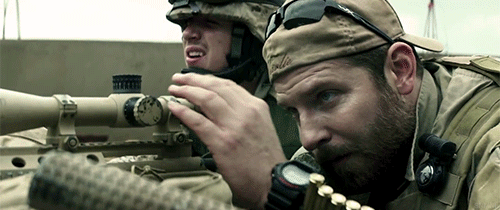“American Sniper” is not a war movie. It takes place during the Iraq War, battles are depicted in gruesome, dramatic fashion, and its protagonist is the most lethal sniper in US history. But it is the story of a cowboy who sought a greater purpose, and for better or worse, found it.
Adapted from his autobiography of the same name, the film follows Chris Kyle (Bradley Cooper, “Serena”) from his childhood in Texas through his military career in the deserts of the Middle East. Although his childhood dream was to become a rodeo champion, upon witnessing the turmoil abroad, Kyle decided to enter the army. Kyle quickly rose through the ranks and became a Navy SEAL. He married and impregnated his wife Taya (Sienna Miller, “Foxcatcher”) before entering his first tour.
By the end of his four total tours in Iraq, Kyle had 160 confirmed kills out of 255 probable kills, earning him the affectionate nickname “legend” from his companions and “the devil” from his enemies. During his service, he survived several bullet wounds and IEDs. A confirmed kill from more than a mile away is remembered as his most miraculous accomplishment. After a 10-year career as a SEAL, he returned home to his wife and children. He suffered from post-traumatic stress disorder, and later assisted other veterans with similar troubles.
Directed by the seasoned Clint Eastwood, “American Sniper” has few frills and quickly, but not abruptly, cuts from one scene to the next. The scenes fly from Kyle’s first hunting kill as a child to picking up Taya in a bar in the span of 20 minutes. However, despite the precise editing and pacing, it does not seem rushed, and the most essential, intimate moments are given adequate time to develop.
Although his aggressive tendencies are apparent from the beginning, Kyle in the end comes across as a big, scruffy charmer with a Southern drawl. He is witty and kind to Taya and his band of brothers. This gentle, personable demeanor combined with genuine patriotism, performed excellently by Cooper, humanizes Kyle. The audience is on his side long before he pulls the trigger for the first time.
The glorification of Kyle’s deadly acts in the movie has led to criticism. Filmmaker Michael Moore posted a tweet claiming, “Snipers aren’t heroes. And invaders r worse.”
But like I said, “American Sniper” isn’t a war movie looking to criticize or praise. It is a movie about a man whose life’s purpose was more or less defined by a war, and any remorse he personally had for his actions were clearly trumped by the duty he felt to his country.
“After the first kill, the others come easy. I don’t have to psych myself up, or do anything mentally,” Kyle writes in his autobiography. “I look through the scope, get the target in the cross hairs and kill my enemy before he kills one of my people.”
Kyle’s protective urges are developed throughout the film. Looking out for his younger brother becomes looking out for his fellow soldiers, a pursuit he struggles to relinquish even when faced with ultimatums from his frustrated family who begs him to stay.
After he agrees to end his SEAL career, “American Sniper” begins to falter. Before the point of his retirement, Kyle’s PTSD is explicitly depicted. He stares at blank televisions, jumps at loud noises and becomes robotic toward his wife. This appeared to be foreshadowing for the extremely difficult journey after his final tour, but the film glosses over most of this struggle. Kyle seems immediately cured by spending time with his fellow veterans, and his own PTSD issues become virtually nonexistent. The cursory glance over his personal issues glorifies Kyle as the ultimate American superhuman, distracting from his true story.
Chris Kyle was killed in 2013 at a shooting range by a veteran who he was trying to help. “American Sniper” is an emotional and excellent homage to Chris Kyle’s life and accomplishments, though sometimes losing itself in the extolled perception of the very man it is trying to show. Regardless of any cinematic faults, he would be happy to know his autobiography was not just another war movie, but the story of his life and how he died trying to help his fellow countrymen.
4.2/5


